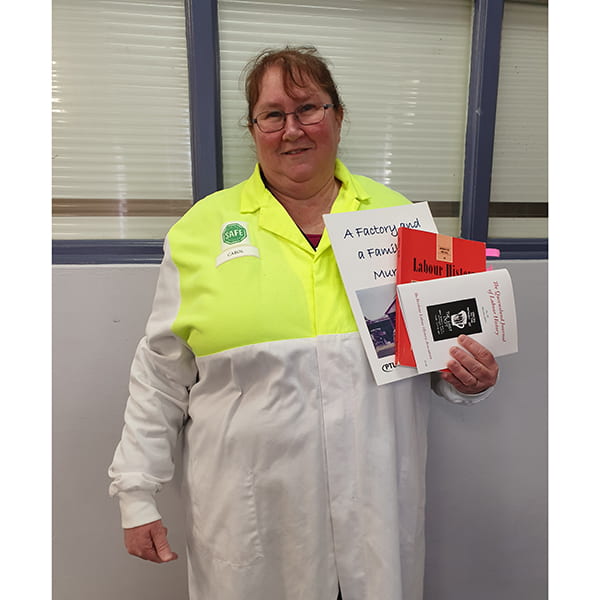A job in a margarine factory helped UNE student Carol Corless find her love for history.
“While working in the factory in Queensland for 28 years, I was the union delegate, and held executive positions, including president, of the Queensland branch of my union, which helped develop my love of labour history.
“Once, I was so annoyed I had to keep explaining to new human resources staff why we had the conditions of employment we did, that I decided to write it all down. I found I really enjoyed it, and I was able to present it at the Labour History Conference in 2005,” Carol says.
An HR employee suggested Carol look into studying a history degree, because of the way her face ‘lit up’ when talking about it. But it took a tragedy to spur her along.
“In 2011, a workmate passed away, and he was younger than me and had a young family. I decided I should no longer put off doing the degree. My daughter was in year 12 and brought home a university admissions book, so I looked in there.”
Carol chose the Bachelor of Historical Inquiry and Practice at UNE both because it could be studied by distance and because she could choose her own projects. In fact, it was a better fit than she could have anticipated: she found an academic with a similar love of labour history who would become her supervisor, as well as some exciting direct applications for her knowledge.
“Knowing I was doing a history degree, my employer asked if I could write a history of the margarine factory worksite before it was due to close in 2016 so the company could print it as a gift for the employees. I used the subject of Local and Community History to assist me to plan the story.
“I was also able to curate my own exhibition at the university archives and build a story around books and oral history tapes as part of the WORK300 subject. This brought together skills from subjects that I had done earlier in my degree – oral history and museums.
“Studying has helped me refine my research skills to better understand the relevance of sources and to find the story in the sources,” she says.
Seven years on from enrolling in her degree, Carol has progressed to a master’s, where she’s delving into the history of strikes in an Australian and global context.
“My research topic is ‘1930s stay-in strikes in Australia’. I am really enjoying putting together the history from the overseas strikes to give context to the Australian strikes as part of my thesis is that it was a wave of strikes moving from Europe to America to Australia during the 1930s.”
She says it’s a topic that remains just as relevant today.
“Studying history is important as it helps us to understand the world we live in and recognise when something is repeating. An example of this is with the current rise in right wing thinking, there can be parallels drawn with what was happening in 1930s Europe.”
While Carol continues to work in the food industry, now as a food safety and risk coordinator for a manufacturer in Canberra, she also sees history continuing to play a role in her future, specifically through “finding interesting stories that need to be told, researching and presenting at conferences.”
For anyone interested in uncovering local history, Carol’s top tip is to join a history or interest group.
“I was a member of the Brisbane Labour History Group when I lived in Brisbane, now I am in Canberra, I have joined the Canberra branch of the Australian Society for Study of Labour History. They have been most helpful with giving me leads as to where to look for sources and have been a great sounding board.”



Recent Comments